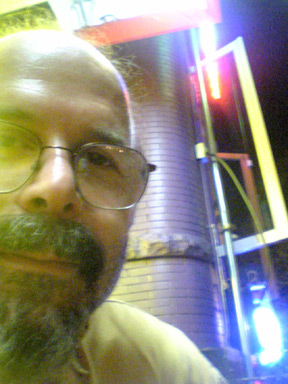Erik's Divali haiku
Odd at times are the ways of our technologies. As I rode a cab last night to Penn Station, via cell phone I took a glance at my email inbox, and was pleased to find a note from Erik Solibakke -- a poet-friend and Meher Baba devotee. Last I knew he was in his native Northern Europe (Norway? Finland? -- I lost track, pardon); turns out he's now living at Meherabad; so I can expect to see him when I make a quick trek out there before my Panvel dhrupad workshop. I'd sent Erik a note not long ago, alerting about this blogging. His generous (flattering) reply encourages me to think there may be some use in this curious pastime; Erik kindly wrote:
Lost in rural Maharashtra and his own thoughs, I'm sure Erik was not referencing the tragic bomb-blasts which wracked crowded markets in Delhi 2 days ago. I know precious little about how Divali is celebrated (other than w/ lighting of lamps); but evidently firecrackers must be part of it. A friend meanwhile had tipped me off to the origin of the festival as a celebration of Raama & Sita's return to Ayodhya -- the happy event near close of the Ramaayana. The haiku evocation is a happy one. Partly responsive to this poem, was my series of verses below (though musing on other storms & sagas). In my own 3rd verse, I was remembering Ghalib's ghazal that begins:
Back to Erik's haiku. The reference to (night) sky happens to remind me that when Raama and Sita returned to Ayodhya (in the ancient tale), they did so by peculiarly modern means: riding on the (legandary) Pushpaka -- maybe the first airplane in literature. I know the story thru Rajagopalachari's likeable English version, which -- along with his Mahabharata -- I devoured in my teens. I can't seem to recall exactly what spin Rajaji put on the Pushpaka; but certainly he did compare it to an airplane.
Thanks for turning me on to your blog. It seems vast and self-renewing at a faster pace than I manage these days now that I'm at Meherabad. I appreciate your original works, insightful and urbane, and the wealth of links you provide; it has become a kind of online culture center for me. Thank you very much for bringing it together and inviting me to share it.-- followed by this haiku:
Diwali fireworks rumble
Sita sets foot in Ayodhya
In the night sky flash
Lost in rural Maharashtra and his own thoughs, I'm sure Erik was not referencing the tragic bomb-blasts which wracked crowded markets in Delhi 2 days ago. I know precious little about how Divali is celebrated (other than w/ lighting of lamps); but evidently firecrackers must be part of it. A friend meanwhile had tipped me off to the origin of the festival as a celebration of Raama & Sita's return to Ayodhya -- the happy event near close of the Ramaayana. The haiku evocation is a happy one. Partly responsive to this poem, was my series of verses below (though musing on other storms & sagas). In my own 3rd verse, I was remembering Ghalib's ghazal that begins:
you should have waited here for me a little longer(though the thought in mine is turned differently. Merely the phrase I was pleased to borrow from Mirza Ghalib.)
now gone you there alone should stay a little longer
Back to Erik's haiku. The reference to (night) sky happens to remind me that when Raama and Sita returned to Ayodhya (in the ancient tale), they did so by peculiarly modern means: riding on the (legandary) Pushpaka -- maybe the first airplane in literature. I know the story thru Rajagopalachari's likeable English version, which -- along with his Mahabharata -- I devoured in my teens. I can't seem to recall exactly what spin Rajaji put on the Pushpaka; but certainly he did compare it to an airplane.


2 Comments:
I've met Erik at Amartithi last year. It's good to find a baba lover on the internet.
Jai Baba
Akshay--
ah, and you're a Punkar I see (and veteran blogger). Thanks for showing up here. Cheers, d.i.
Post a Comment
<< Home